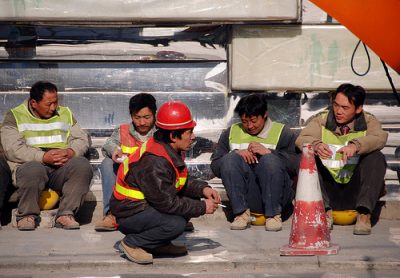Last year we estimated that the total employment impact of the GFC was between 13 and 19 per cent. But we emphasised that the adverse shock to employment was in fact the joint outcome of the global financial crisis and China’s domestic policy stance—most prominently, China’s contractionary macroeconomic policy and its implementation of the New Labour Contract Law.
With the fiscal and monetary expansions in response to the global financial crisis and the gradual recovery of external demand, China bounced back forcefully from a gross domestic product (GDP) growth rate of 6.1 per cent in the first quarter of 2009, to 7.8 per cent in the second quarter. By the end of 2009, the growth rate exceeded the 8 per cent target.
Now that the immediate crisis is over, we have re-evaluated its effect upon migrant labour-market outcomes. This re-evaluation revealed a markedly different picture.
Using the panel surveys of rural–urban migrants and rural households in the Rural–Urban Migration in China and Indonesia (RUMiCI) Project, we compared the labour-market outcomes of migrants in cities in 2008 and 2009. Much to our surprise, we observed small employment effects and virtually no reduction in working hours or wages for migrants. Migrants who decided to stay in cities in 2009 suffered very little in terms of employment, working hours and earnings.
Rather, the global financial crisis impacted mainly upon the rural sector—to where the unemployed migrant workers from cities returned. Unemployed migrant workers had less money, which suppressed demand in the rural sector, which, in turn, further suppressed the creation of rural off-farm jobs. This ‘multiplier effect’ was very large and has received little attention in the literature before.
In statistical terms, no less than 15 million rural migrants (more than 10 per cent of total migrants) returned to rural villages in 2009. About 80 per cent of them went back to the rural farming sector, where they worked, on average, for 52 per cent of the year. In addition to the effect of the global financial crisis on return migration, we found that rural off-farm employment fell by about 38 million or 7.5 per cent of the total rural hukou labour force. But for those already employed in rural off-farm jobs, no downward adjustment to hours or earnings was detected.
Based on our findings it is probable that the rural agricultural sector provided the employment buffer for return migration and rural off-farm employment during the global financial crisis. Because of this buffer effect, no open unemployment was observed. This is certainly a good thing for political stability, but also means a reduction in agricultural productivity.
In the long run, small-scale farming will inevitably give way to large landholding and higher agricultural productivity. This will naturally lead to the consolidation of farmland, and many small landholders will need to sell their land. For these workers, then, future employment shocks will have to be cushioned by other means.
The real question is how will this be done? How will China move towards a universal welfare system and give migrants the rights to sell their land, effectively trading an inefficient land-based traditional welfare system for one that is more appropriate for a modern economy?
In the decades ahead, policymakers’ responses to this question will have a substantial impact on the wellbeing of Chinese migrant workers.
Sherry Tao Kong is Research Fellow at the College of Business and Economics, ANU. Xin Meng is Professor of Economics at the College of Business and Economics, ANU. Dandan Zhang is Postdoctoral Fellow at the College of Business and Economics, Australia National University.
This essay is a summary of an article published in Ross Garnaut, Jane Golley and Ligang Song (eds): ‘China, The Next 20 Years of Reform and Development.’


Just a comment on the main point in the following paragraph: “In the long run, small-scale farming will inevitably give way to large landholding and higher agricultural productivity. This will naturally lead to the consolidation of farmland, and many small landholders will need to sell their land. For these workers, then, future employment shocks will have to be cushioned by other means.”
There may be alternatives to just selling their land. For example, some of them may find it more beneficial in holding their land and rent the land to some organisations or persons. In that way, it is still possible to consolidate land holdings for larger scale agricultural production, but allows a diversified ownership, not too dissimilar to share holding in listed firms.
The potential appreciation of some land, especially those likely to be used for other more valuable purposes means some holdings may be good for some small “land holders” to continue to hold their land.
In short, there should be a diversifying and flexible system to provide different options for land holders of different circumstances.